As the secretariat of the RIPE community, the RIPE NCC has had the privilege of observing and facilitating the evolution of RIPE Meetings over time. Looking forward, we are excited about the opportunities that await us and the potential challenges as we continue to foster collaboration and innovation within the community.
The RIPE community was founded on principles such as openness, inclusion, collaboration, and transparency, which are intended to guide every participant’s interactions. For over three decades, the key to the RIPE community’s sustained success and relevance has been finding the right balance between valuing the deep knowledge and experience of long standing participants while actively welcoming new contributors with fresh perspectives.
In recent years, the community, led by the RIPE Chair team, has taken significant steps to promote diversity and inclusivity, actively implementing a range of strategic measures through the adoption of recommendations from both the RIPE Accountability Task Force and the Nominating Committee, as well as the implementation of the Code of Conduct. The RIPE Chair team has worked closely with the community and the RIPE NCC as its secretariat to nurture the values of the community and has made strides in creating an inclusive and supportive environment for all its participants. This was achieved through various initiatives, including documenting governance structures and launching initiatives to streamline the Working Group Chair succession planning as well as clarifying the participation of RIPE NCC staff in RIPE.
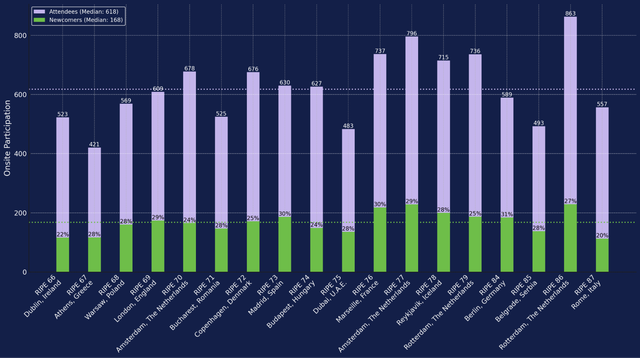
By examining RIPE Meeting attendance numbers over the past decade, we find that the median number of attendees is around 618, suggesting a robust and stable core participant base. Coupled with a median of 168 newcomers, which is between 20-30% of participants at each meeting. That indicates the continual renewal of the community fabric by attracting new participants to refresh the collective intellect and energy of the group as participants retire.
Further analysis is required to evaluate our success in retaining newcomers, which is complicated by several biases including length-bias, where earlier newcomers had more chances to attend; exposure-bias, with higher retention in countries hosting more than one RIPE Meeting; and missing registration data from pre-COVID online participation. We are very interested in any insights or models that can help mitigate these biases to refine our analysis.
Being inclusive
When organising RIPE Meetings, we strive to address accessibility, diversity, safety and security, representation and sustainability within the wider logistics of event organising. Inclusivity is always going to be a goal and something to keep striving for.
Representation and diversity
Our objective is to welcome fresh perspectives and new members, while valuing the wisdom and experience of our long-standing participants. Initiatives such as the RIPE Fellowship, RIPE Academic Cooperation Initiative (RACI) and student engagement programmes were introduced to help break down barriers to attendance, so financial constraints do not hinder the influx of new ideas and contributors from across our service region. One important aspect, and the reason for the RIPE community’s success, is the trust that is built over time. It is important that barriers are lessened so new community members can attend and hear from those who have been here for decades and can impart their wisdom while they in turn hear fresh ideas.
The diversity and inclusion session at RIPE 87 also highlighted issues of gender representation, with female participation at RIPE Meetings hovering just under 15%, a figure that is noticeably low compared to women’s representation in the broader IT industry. Interestingly, despite some initial safety concerns raised when Belgrade was announced as the host of RIPE 85, the meeting marked the best performance in terms of female representation to date, with women making up almost 20% of the attendees, many of whom were newcomers.
Safety and security
The RIPE region is rich with diverse cultures, norms and values. Safety, both physical and emotional, is a fundamental necessity for all attendees, especially when traversing countries with varying cultural landscapes. We are committed to providing more comprehensive information on safety and security for all selected countries for RIPE Meetings as well as RIPE NCC regional meetings. We will also provide more health and hygiene advice and safety measures through our meeting websites.
Accessibility
We strive for accessibility, both physical and virtual, and prioritise venues that aim to provide facilities such as ramps and elevators for wheelchair users, along with space for manoeuvrability.
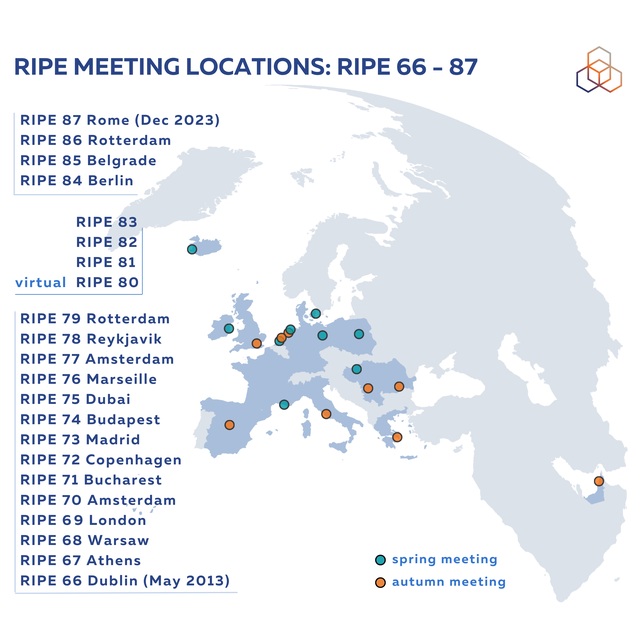
Looking back at RIPE 87 in Rome, we must acknowledge the difficulties we faced in securing an accessible venue for the event and thank those who took the time to provide their feedback. Due to COVID-19 disrupting our long-term planning cycle, we had limited options for venue selection. Despite our efforts, we regrettably fell short in providing a fully accessible environment for all participants. We remain committed to prioritising accessibility at future RIPE Meetings.
Our remote participation options, facilitated by platforms like Meetecho, enable individuals from around the world to engage in RIPE Meetings. Real-time captioning services, supported by stenography, means that all participants can follow discussions seamlessly. Additionally, active chat monitoring guarantees that every participant's input is acknowledged and integrated into discussions, fostering a truly inclusive environment where all voices are heard and valued. As part of our ongoing commitment to accessibility, we're continuously working to enhance our digital platforms and make our websites compliant with Web Content Accessibility Guidelines (WCAG).
Sustainability
Prospective venues are evaluated on their sustainability credentials, carbon emission reduction efforts, and resource conservation initiatives during site visits. Drawing inspiration from the Internet Engineering Task Force (IETF) and their proactive measures to lower the environmental footprint of meetings and compensate for carbon emissions. These considerations were influential in choosing the RIPE 86 venue in Rotterdam, despite the logistical hurdles due to limited accommodation options nearby.
RIPE Meetings are the main forum where we help to bring the RIPE community together, while the regional meetings allow us to meet community participants where they are, lowering the travel costs, visa restrictions and language barriers that prevent them from attending and participating at RIPE Meetings predominantly held in Europe. Each of these meetings allow around 200-250 community participants to engage locally, avoiding the carbon emissions from air travel to RIPE Meeting locations.
The local hubs at RIPE 87 used COVID-19 inspired insights and technologies to connect remote participants to the meeting. Thereby reducing carbon emissions by providing an alternative to long-distance travel while fostering a sense of community by creating spaces for local community participants to meet and engage with the meeting’s activities.
We are also moving to reduce the use of printed materials at RIPE Meetings, beginning with a redesign of our traditional name tag badges. At RIPE 88 in Krakow, we'll be introducing a pilot of our new badge concept: smaller and more sustainable. We're eager to gather feedback from the community to keep refining the badges.
Recovering from COVID-19
The planning and organisation of RIPE Meetings commences more than two years in advance. This extended lead time is essential to secure venues that can accommodate the RIPE community needs, as the most suitable locations are often booked out years in advance. RIPE Meetings are held during peak seasons for hotels and coordinating our schedule with other global technical and Internet coordination meetings significantly constrains our flexibility.
COVID-19 significantly disrupted our long-term planning processes. The unpredictability of the pandemic also necessitated a temporary halt in our search for hosts. The forced reduction in our planning timeline has led to a scarcity of available venues, drawing criticism towards some of the recent RIPE Meeting venues. We are gradually regaining our footing, and we are currently organising the RIPE 89, 90, and 91 meetings. By RIPE 88, we aim to finalise the meeting hosts, locations and venues, returning to our standard planning cycle.
Finding suitable venues
Identifying the ideal venue for RIPE Meetings involves locating a space that is not only large enough but also conveniently positioned near city centres, airports, and public transport links. Our requirements are too comprehensive for venues in most city centres, including a plenary room capable of seating at least 700 attendees, a breakout room for 150 attendees, a coffee break area for 500 individuals, dining facilities for at least 400 people, and accommodation for over 350 attendees or nearby hotel capacity. These specifications narrow down the pool of suitable venues, exacerbating the difficulty with inflated venue costs.
The rising costs of RIPE Meetings
The cost of organising RIPE Meetings has more than doubled from 2013 to 2023. In the face of these escalating costs, the RIPE NCC has made concerted cost efficiency efforts. We have cut costs across several categories, including staff travel, equipment rental, entertainment, and marketing expenditures. We also reviewed our process for issuing free RIPE Meeting tickets in 2023 to make cost savings where we can without compromising on the quality of our events. However, despite these efforts, venue and catering expenses have increased, rising from 48% to 55% of the total meeting expenses.
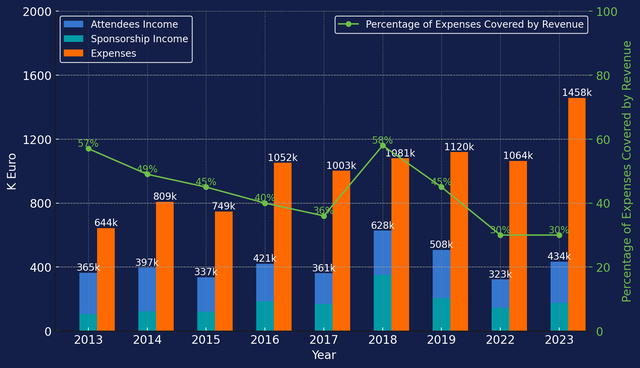
The total income generated from these meetings has only seen a marginal increase over the decade. The difference in the percentage of expenses covered by revenue is significantly increasing annually, with the highest coverage rates in 2013 and 2018 covering over half of the meeting costs, and the lowest in 2022 and 2023 only covering less than a third. This declining trend in expenses covered by revenue has necessitated a substantial contribution from the RIPE NCC membership, which exceeded 1 million euros in 2023.
Maintaining affordable ticket prices means that RIPE Meetings have remained accessible to many, but this has led to an increasing reliance on membership contributions to cover rising costs and poses a challenge we and the RIPE community need to address.
In light of this, we have streamlined our sponsorship packages by introducing three new categories. We now offer Event Sponsorship tailored specifically for RIPE Meetings. We also provide Data and Measurements Sponsorship, aimed at supporting our data services including RIPE Atlas, RIPEstat, and the RIPE Routing Information Service (RIS) used to provide various insights into the Internet's technical operations presented at RIPE Meetings. Additionally, we launched a Community Initiative Sponsorship aimed at fostering a vibrant and open RIPE community through supporting initiatives such as the RACI, RIPE Meeting Fellowships and efforts in diversity, equity and inclusion. Sponsorships here support the very heart of the Internet community itself.
These simplified sponsorship options make it easier for organisations to collaborate with us during RIPE Meetings. This support from the community and the broader Internet sector enhances our events that benefit everyone through information sharing, capacity building, and the advancement of those working in network operations.
A balancing act
Organising RIPE Meetings represents a balancing act that extends far beyond the logistical and operational challenges typically associated with event planning. Each decision made, from the selection of venues to the structuring of the Fellowship programme, encapsulates a deeper reflection of the RIPE community's core values: openness, inclusion, collaboration, and transparency.
This balance is evident in the way we navigate between venue convenience and costs, ensuring that our meetings are accessible to as many participants as possible without compromising financial sustainability. It's seen in our efforts to grow community participation while maintaining a commitment to environmental stewardship and inclusivity, so that our expansion does not dilute the quality of participation or exclude valuable voices.
The selection of countries for our meetings, rotating between more and less expensive regions allows us to uphold our value of openness, making it feasible for participants from different economic backgrounds to participate, while also navigating the complexities of international travel restrictions and cultural norms.
Navigating these challenges is complex and requires continuous dialogue, adaptability, and innovative thinking within our community. Join us in these discussions on the RIPE NCC Forum, RIPE mailing list and at RIPE 88. Let’s work together so that RIPE Meetings continue to reflect our commitment to serving the long-term interests of our community. We welcome your insights, suggestions and sponsorship contributions to foster a vibrant and open RIPE community through initiatives that benefit the Internet.

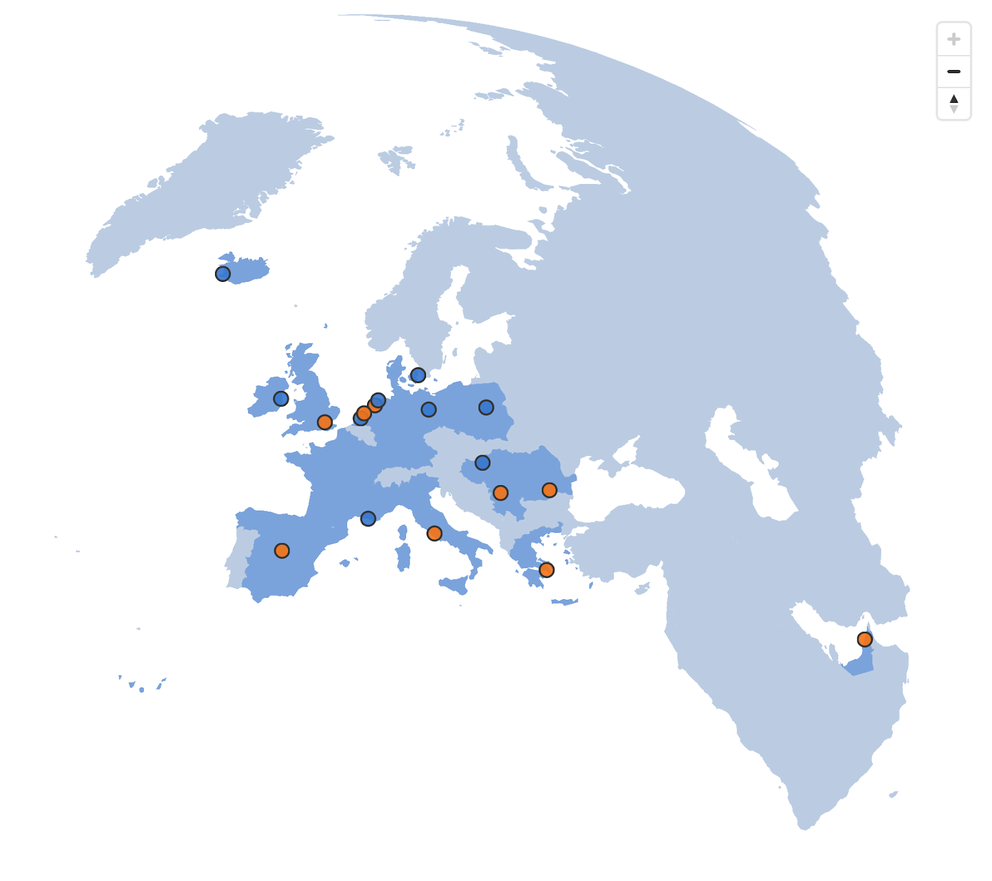


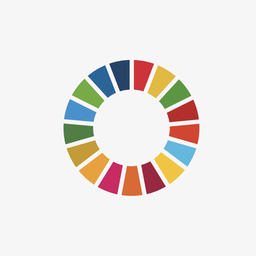


Comments 0
The comments section is closed for articles published more than a year ago. If you'd like to inform us of any issues, please contact us.